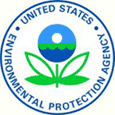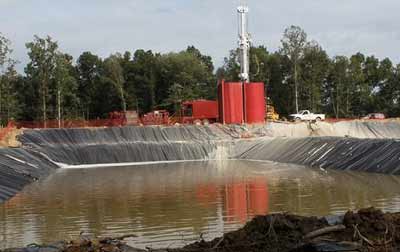Contains the keyword legal
"Answers to questions frequently asked by landowners about oil and gas leases and drilling." Commonwealth of Pennsylvania, Department of Environmental Protection.
For more information, visit DEP’s Web site at Keyword: “Oil and Gas.”
Get an in-depth pollution report for your county, covering air, water, chemicals, and more. Enter your zip code for local information.
Take Action: Oppose EPA's efforts to weaken pollution reporting
 |
Who are the top polluters in the U.S.? |
We think American citizens have a right to know what toxic chemicals are being released into their communities. But the EPA recently proposed to limit the information that companies are required to disclose about the hazardous chemicals they release into our environment.
By reducing the reporting requirements of its Toxics Release Inventory program, the EPA would take away an important tool for protecting public health and reducing industrial pollution.
Supported by Green Media Toolshed.
See: Big Polluters Freed from Environmental Oversight by Stimulus - The Center for Public Integrity
The mission of the Red Lodge Clearinghouse is to support, connect and inform the partners of collaborative efforts and others addressing natural resource challenges in their community.
This blog features a page on Oil and Gas Resource Development that has many links to primary legal documents. It is based in the U.S. Western States.
Here is a link to their Staff listing:
"New York state environmental officials announced Friday that they would impose far stricter regulations for a new type of natural gas drilling in the state’s only two unfiltered water supplies, making it highly unlikely that any drilling will be done in the Catskills watershed that supplies drinking water to New York City...
...Although they did not impose an outright ban, state officials said that any natural gas company would have to conduct a separate environmental impact review for every well it proposed to drill in either watershed. In other areas, companies would face a far less cumbersome permit process that would rely on the state’s own environmental assessment of where drilling can be allowed...
...With a major controversy surrounding the proposed drilling out of the way, state officials said that they expected to release their final regulations on hydraulic fracturing by the end of the year after considering more than 14,000 public comments.
While it stirred deep opposition in New York City and nearby counties, the drilling drew substantial support from many upstate residents who argued that the benefits would far outweigh any risks given the weakness of the economy.
The conservation department’s commissioner, Pete Grannis, said that landowners’ property rights had weighed heavily in the decision not to issue a ban on drilling in the two watersheds. He said that about 70 percent of watershed property is privately owned and that a ban would have undoubtedly brought on lawsuits from owners deprived of lucrative leasing deals with gas companies.
“At the end of the day, an outright ban risks very substantial litigation,” he said.
Instead, the department decided to add more scrutiny to any potential application to drill in the two areas, he said.
But while the well-by-well environmental reviews will be a deterrent to the drilling, environmental groups were not claiming victory. Kate Sinding, a senior attorney with the Natural Resources Defense Council, said nothing but a ban would ensure that gas companies do not exploit the watersheds in the future.
“If they get into the shale and find it productive, they’re going to knock on the door of the watershed,” she said. “This announcement puts off for another day a decision that could be made today"...
...Jim Smith, a spokesman for the Independent Oil and Gas Association of New York, called the state’s regulatory stance “excessive and unnecessary.”
...Deborah Goldberg, an attorney with Earthjustice, an environmental law firm, said the final SGEIS must include substantial changes to account for the cumulative effect of drilling thousands and perhaps tens of thousands of Marcellus wells in New York. If not, the firm will help spearhead a legal challenge, most likely in state Supreme Court in Albany.
That would involve filing an Article 78 Proceeding challenging the DEC's adherence to the State Environmental Quality Review Act.
See: Eileen Millett, Toxic Tort Litigation Blog.
The challenge for attorneys and for courts will arise as communities grapple with:
- Managing the use of water, water withdrawals, what authority controls and who regulates;
- Impacts if any on waterbodies and aquatic life in affected water bodies accepting chemical fluids of varying composition;
- Adequacy and availability of treatment and pre treatment facilities.
See: Dave Cohen. Energy Bulletin. "Shale Gas Shenanigans" Mar 29 2010.
A disturbing amount of the climate justice movement’s “action” is taken alone, within our own homes.
We sit at our computers and post, Tweet, comment and write op-eds. We call our Senators and legislators. We change our light bulbs and insulate our homes (literally and figuratively.)
The picture that naturally develops in our minds is of little me, sitting here fighting the world’s biggest corporations and their political stooges. That’s a pretty discouraging picture.
Despite all the attempts of social media to build “community,” everyone is still sitting alone at computers. We did not evolve to develop powerful relationships with an avatar, sending us an instant message.
That’s why a million screen names out there somewhere don’t help us deeply internalize the truth that we are part of something large and powerful. We evolved to connect with human beings that we can see, hear, smell and feel, and it is that kind of connection that empowers us on a deep level...
...The more I advocate for stronger and bolder action from climate activists, the more I see the need for real human connections. No amount of social media can match the empowerment of being in the streets with thousands of other people who share our passion. That’s why mass mobilizations that engage in bold action are so important for our movement.
Read joint letter explaining the urgent need for solidarity on December 13th.
See: "Student Disrupts Government Auction of 150,000 Acres Of Wilderness For Oil & Gas Drilling."
 For full interview click here.
For full interview click here.
See: Judge says drilling lease lawsuit too late
See: Tim DeChristopher's blog and update on his legal battle.
See: As climate crime continues, who are we sending to jail? Tim DeChristopher?
A call to reduce the exorbitant bail set for non-violent civil disobedience.
Madison, W.Va. – EmmaKate Martin and Benjamin Bryant were arrested this morning while blockading the driveway to Massey Energy’s regional headquarters in Boone county, W.Va. Magistrate Snodgrass set their bails at $100,000 each for misdemeanor charges of trespassing, conspiracy to commit a misdemeanor, obstructing an officer, and littering.
Source: Climate Ground Zero
Andrew works for the Student Environmental Action Coalition's as administrative coordinator. As a student, he organized for the Michigan Student Sustainability Coalition. There are not many things he loves more than movement building.
May 17, 2010: Climate Ground Zero Activists Blockade Massey Energy Headquarters
On the morning of May 17, 2010 two activists associated with Climate Ground Zero erected a tripod tent on the driveway of Massey Energy's regional headquarters in Boone county, West Virginia. The two activists, EmmaKate Martin and Benjamin Bryant, locked themselves to the base of one of the poles. Both were arrested and charged with misdemeanor offenses of trespassing, conspiracy to commit a misdemeanor, obstructing an officer and littering. Their bails were set for $100,000 each by West Virgina Magistrate Snodgrass.
The banner they hung from the tripod read “Massey, Profits Before People & Mountains, Fight Back!” The bail was the largest ever set against any activists conducting non-violent actions against mountaintop removal in West Virginia.[56]
David Sternberg. 1/27/2010. "EPA Announces “Eyes on Drilling” Tipline".
The U.S. Environmental Protection Agency today announced the creation of the “Eyes on Drilling” tipline for citizens to report non-emergency suspicious activity related to oil and natural gas development.
The agency is asking citizens to call 1-877-919-4EPA (toll free) if they observe what appears to be illegal disposal of wastes or other suspicious activity.
Tip email address: eyesondrilling@epa.gov
Citizens may provide tips anonymously if they don’t want to identify themselves.
EPA's Mid-Atlantic Region has a natural gas drilling tip line for reporting dumping and other illegal or suspicious hauling and/or disposal activities.
Tip mailing address: EPA Region 3
1650 Arch Street (3CEOO)
Philadelphia, PA 19103-2029
In the event of an emergency, such as a spill or release of hazardous material, including oil, to the environment, citizens are advised to call the National Response Center at 1-800-424-8802.
Public concern about the environmental impacts of oil and natural gas drilling has increased in recent months, particularly regarding development of the Marcellus Shale formation where a significant amount of activity is occurring.
While EPA doesn’t grant permits for oil and gas drilling operations, there are EPA regulations which may apply to the storage of petroleum products and drilling fluids. The agency is also very concerned about the proper disposal of waste products, and protecting air and water resources.
See: Marcellus-Shale.us based in Pennsylvania, Photographs of fracking trucks.
The UIC Program is responsible for regulating the construction, operation, permitting, and closure of injection wells that place fluids underground for storage or disposal.
This site provides information for owners and operators of injection wells and state regulators on how to safely operate injection wells to prevent contamination of underground drinking water resources.
See: A searchable database covering all EISs filed with EPA since January 2004.
See: Where You Live (EPA) Regional Contacts.
State UIC Programs have primary enforcement responsibility (or primacy) once their UIC programs have been approved by EPA. The UIC Program Primacy page provides information about the requirements for obtaining primacy and which states have been granted this authority.
The UIC Program requirements were developed by EPA and designed to be adopted by states, territories, and tribes. States, territories, and tribes can submit an application to EPA to obtain primary enforcement responsibility, or primacy.
Agencies that have been granted this authority oversee the injection activities in their states. The requirements for primacy programs are outlined in the UIC regulations at 40 CFR Part 145.

New York Department of Environmental Conservation (NYDEC). Information from DEC with links to other legal issues.
See: Landman Report Card
- 'Sunlight is said to be the best of disinfectants.'
- -- U.S. Supreme Court Justice Louis Brandeis
- 'Secrecy is the badge of fraud'
- -- Sir John Chadwick (b. 1941), British judge
- 'Every thing secret degenerates, even the administration of justice; nothing is safe that does not show how it can bear discussion and publicity.'
- -- Lord Acton (1834-1902), English historian
- 'The first principle of a free society is an untrammeled flow of words in an open forum.'
- --Adlai Stevenson (1900-1965), American statesman
- 'Give me the liberty to know, to utter, and to argue freely according to conscience, above all liberties.'
- --John Milton (1608-74), English poet
BAN is the world's only organization focused on confronting the global environmental injustice and economic inefficiency of toxic trade (toxic wastes, products and technologies) and its devastating impacts.
Working at the nexus of human rights and environment, we confront the issues of environmental justice at a macro level, preventing disproportionate and unsustainable dumping of the world's toxic waste and pollution on our global village's poorest residents.
At the same time we actively promote the sustainable and just solutions to our consumption and waste crises -- banning waste trade, while promoting green, toxic free and democratic design of consumer products.
BAN is a 501(c)3 charitable organization of the United States, based in Seattle, Washington
BAN leaked the Summers Memo in 1991 that Summers signed while he was Chief Economist of the World Bank.
Hydraulic Fracturing involves dumping millions of gallons of toxic slaine brine whose ingredients remain a trade secret due to monitoring exemptions granted by the 2005 Energy Policy Act.
See: Jennifer Clapp. (2010). Toxic Exports: The Transfer of Hazardous Wastes from Rich to Poor Countries. Cornell Univ Press. 2010.
See: Gas Drillers Plead Guilty to Felony Dumping Violations
See: Tragedy of the Commons | Mixplex
See: Barlow, Maude. Blue Covenant: The Global Water Crisis and the Coming Battle for the Right to Water. The New Press, 2009.














